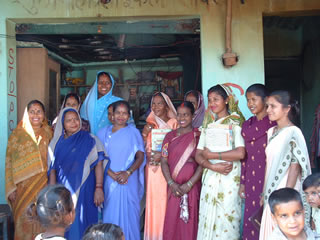Empowering Women
Every literate woman marks a victory over poverty.
~ UN Secretary-General Ban Ki-moon
 Despite many international agreements affirming their human rights, women are still much more likely than men to be poor and illiterate. They usually have less access than men to medical care, property ownership, credit, training and employment. They are far less likely than men to be politically active and far more likely to be victims of domestic violence. In spite of the fact that most development agencies identify women's literacy as the single most important factor in development, one out of every three women in the world cannot read and write. UN Secretary-General Ban Ki-moon stressed the transformative effect on both a family and the wider community when a woman is literate. “Literate women are more likely to send their children, especially their girls, to school,” he said. “By acquiring literacy, women become more economically self-reliant and more actively engaged in their country’s social, political and cultural life.”
Despite many international agreements affirming their human rights, women are still much more likely than men to be poor and illiterate. They usually have less access than men to medical care, property ownership, credit, training and employment. They are far less likely than men to be politically active and far more likely to be victims of domestic violence. In spite of the fact that most development agencies identify women's literacy as the single most important factor in development, one out of every three women in the world cannot read and write. UN Secretary-General Ban Ki-moon stressed the transformative effect on both a family and the wider community when a woman is literate. “Literate women are more likely to send their children, especially their girls, to school,” he said. “By acquiring literacy, women become more economically self-reliant and more actively engaged in their country’s social, political and cultural life.”
Irina Bokova, the Director-General of the UN Educational, Scientific and Cultural Organization (UNESCO), said that investing in women’s literacy carries very high returns.
It improves livelihoods, leads to better child and maternal health, and favours girls’ access to education. In short, newly literate women have a positive ripple effect on all development indicators.
